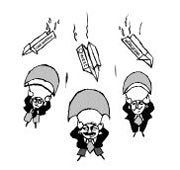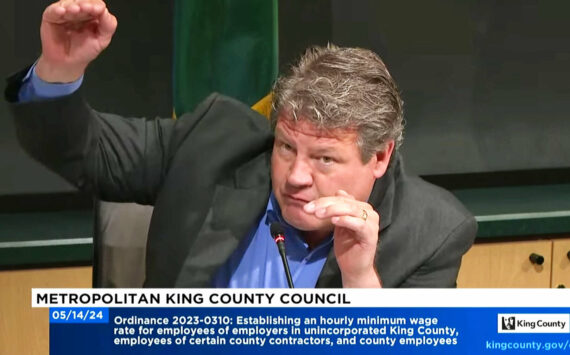WHEN, LAST FALL, the Enron story shifted from Disintegrating Company to Disintegrating Ponzi Scheme, economists uniformly predicted that other shoes would drop—that others perched high in the Fortune 500 were also certain to fall.
It’s happening. This week, the business pages have been alive with the sound of dropping shoes.
Most notable locally has been Qwest, the Denver-based company that provides most of our local phone service. Qwest wasn’t a new name for U.S. West—it was a separate company that bought the much larger U.S. West in 1999. The bursting of the stock market’s telecom bubble has had enormous implications for Qwest: Its stock has been plummeting for months; the Securities and Exchange Commission (SEC) is investigating its accounting practices; several of its multibillion-dollar debts are coming due this summer; and last week, its corporate bonds were officially downgraded to “junk” status by Moody’s. Is bankruptcy far off?
Qwest’s desperate need for cash has fueled everything from its sale of customer information to its effort to enter the long- distance market. There, it would run up against a much larger company in similar straits: WorldCom, owner of MCI.
Last month, WorldCom announced a rate hike affecting 20 million customers worldwide; it, too, needs cash. CEO Bernard Ebbers resigned last month. WorldCom made 75 acquisitions in 19 years (including MCI and CompuServe) and has run up a staggering $29 billion in debt; its stock price has dropped from a 1999 high of $64.50 to about $2.35 now. Its bonds—WorldCom is the country’s seventh largest issuer of corporate bonds—aren’t officially junk yet, but they’re now trading at junk status. And WorldCom is under investigation by the SEC for income-reporting practices that look a lot like Enron’s.
SEC investigations and disappearing executives were in vogue last week. William McCormick, chairman and CEO of CMS Energy—an Enron-style energy trading company—announced his resignation, less than two weeks after the company admitted that it conducted energy trades to falsely inflate revenue by more than $4.4 billion.
Four days later, Chuck Watson, co-founder, chairman, and CEO of Dynegy Corp.—which tried to buy the failing Enron—also resigned. Dynegy’s stock is off 88 percent, and the company (26.5 percent of which is owned by ChevronTexaco) is under investigation for sham trades. The SEC is also investigating Dynegy natural gas contracts that gave an $80 million tax benefit and resulted in $300 million in net cash flow last year. Watson’s interim replacement, Steve Bergstrom, acknowledged that in terms of such investigations, “When we look at the other players in the industry, we all look pretty similar.” Dynegy and other big remaining energy traders (Duke Energy, the Williams Companies, Mirant, Calpine) vehemently denied last month’s revelations, in insider memos released by federal regulators, that not only did Enron engage in a stunning variety of predatory practices during the 2000- 2001 energy crisis but that “everybody was doing it.” Now, they do all look similar: under SEC investigation for allegations like sham trades, questionable accounting practices, and market manipulations that victimized local utilities and ratepayers.
The Enron documents, in particular, shed light on how California’s crisis was not only created, exacerbated, and prolonged but spread to other Western states like Washington. Among other things, the gap between the fall 2000 capping of energy prices by California regulators and a regionwide cap finally imposed by the Bush administration the next summer allowed traders to engage in “kilowatt laundering”—buying capped California energy and selling it at vastly higher prices in Washington, and also buying it back here and using that inflated cost as an exemption to charge the same in California, evading the cap without actually moving anything anywhere.
It’s no coincidence that so many of these large Enron-style debacles, involving shady accounting practices, market manipulation, and victimization of both investors and consumers, are coming in recently deregulated industries.
Deregulation, we were told, would lead to “efficiencies” in the market. Sure enough: It’s amazing how efficient you can be when you not only don’t have to actually produce anything, but you don’t have to buy or sell it to anyone, either—you just pretend you did. But the rest of that equation—better service and lower prices for you and me—never materialized.
It never does, because the ultimate in “efficiencies” is called a monopoly. These industries were regulated in the first place because of the widespread realization a century ago that allowing huge corporations monopolies for essential services is a recipe for social disaster. It’s one thing if a company behaves badly while selling spatulas; it’s quite another if it traffics in electricity, water, phone service, or administration of prisons, schools, or welfare programs.
For some reason—perhaps because our decision makers get thinly disguised bribes called “campaign contributions” from their beneficiaries—the lessons of long ago have been discarded. CEOs can rationally calculate that the cost of breaking the law and defrauding the public is negligible: nothing a contract buyout and a new job won’t cure.
That pitter-patter you hear is the sound of dropping shoes.







